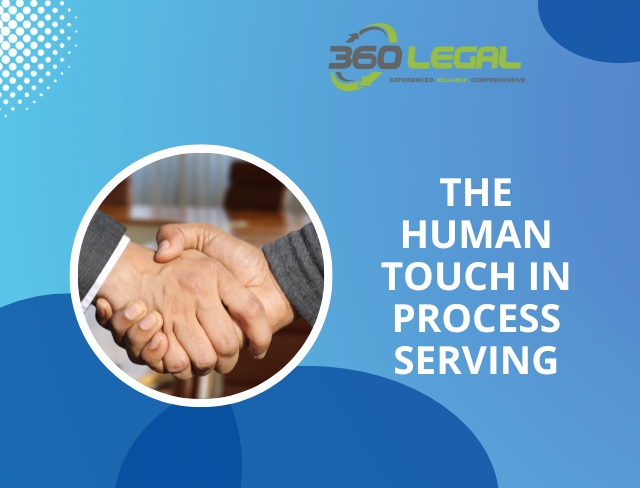Testing RSS Feeds.. ignore post.
Testing RSS Feeds.. ignore post.
The Human Touch in Process Serving

In an age where automation and technology often dominate various sectors, the legal services industry is no exception. From e-filing systems to virtual courtrooms, the march toward digitization is unstoppable. However, there remains one area where the human element is not only appreciated but essential: process serving.
Importance of Human Interaction in Process Serving
While technology has streamlined many of the logistical aspects of legal service, the initial phase of delivering court papers still necessitates a personal touch. Technology might be able to locate a person, but it takes a human being to navigate the subtleties of actually serving legal documents. Building rapport, asking pertinent questions, and reading body language are not things robots can easily replicate.
Empathy and Understanding
In this line of work, process servers often meet people at less-than-ideal moments in their lives. An understanding demeanor can make a world of difference in how the legal process is initiated.
The following is a DRAMATIZATION AND IS NOT AN ACTUAL EVENT: A process server named Emily had to serve divorce papers to a man named Robert. Rather than just handing over the papers and leaving, Emily sensed that Robert was distraught. She took an extra minute to explain that she was just a messenger and offered brief details on what he should do next. This empathetic approach eased Robert’s anxiety and gave him clarity on the forthcoming legal proceedings.
Flexibility and Resourcefulness
Each case has its unique challenges. While technology can predict patterns, it can’t adapt to unforeseen circumstances the way a human can.
The following is a DRAMATIZATION AND IS NOT AN ACTUAL EVENT: Mark, another process server, arrived at an address to serve eviction papers. The person wasn’t home, but a neighbor informed him that the person works night shifts. Mark returned at a time he thought would be convenient for the recipient and successfully served the papers.
Cultivating Professional Relationships
A significant part of process serving involves working closely with law firms, attorneys, and other legal professionals. The relationships built here are based on mutual respect and reliability, something that an automated system can’t fully ensure.
In a profession where human interaction is a key component, the ability to cultivate personal relationships goes beyond mere job requirements. It becomes an essential aspect of career growth and client satisfaction. These relationships aren’t limited to clients or immediate business partners; they extend to colleagues, mentors, and even people who were once on the other side of a served notice.
Building a Network Through Authentic Interactions
Unlike automated systems, which operate on binary codes and algorithms, human interactions are complex and layered. An authentic smile, a firm handshake, or a consoling word—these small yet meaningful gestures can have a significant impact and often lead to lasting professional relationships. Networking isn’t just about attending industry events or sharing business cards. It’s about forming a genuine connection with people.
The following is a DRAMATIZATION AND IS NOT AN ACTUAL EVENT: Jack, a seasoned process server, frequently participated in legal seminars not just to acquire knowledge but also to build his professional network. Over time, he developed friendships with lawyers, paralegals, and even judges. These connections turned out to be invaluable, as they led to referrals and new business opportunities.
Mentorship: A Two-Way Street
Cultivating personal relationships is not just about peer-level interactions; it’s also about mentorship. Senior process servers can offer guidance and career advice to newcomers, helping them navigate the complexities of the job. Conversely, newer entrants can offer fresh perspectives and familiarity with new technologies, making this a mutually beneficial relationship.
The following is a DRAMATIZATION AND IS NOT AN ACTUAL EVENT: Brian, a new entrant into the process serving world, was mentored by Elaine, a 20-year veteran in the field. While Elaine helped Brian understand the legal intricacies, Brian introduced her to the latest tracking and communications technology, streamlining her operations.
Trust Through Long-Term Partnerships
Once a process server proves to be reliable and efficient, attorneys tend to stick with them. This level of trust is often built through face-to-face interactions, handshakes, and direct communication.
Value of Immediate Feedback
When serving documents, process servers might discover information beneficial to a case. This intelligence is often communicated directly to attorneys, providing invaluable, timely insights that a digital system might miss.
Challenges of the Job: When the Human Element Takes a Toll
Process serving is not always straightforward; it has its fair share of challenges that require a strong will and ethical backbone. The duty of delivering legal documents to individuals informs them of legal actions taken against them or matters requiring their response. This sensitive task sometimes places process servers in unpredictable and potentially uncomfortable situations, emphasizing the importance of patience, resilience, and professionalism.
Dealing with Uncooperative Individuals
One of the substantial challenges process servers face is dealing with individuals who are not willing to cooperate. Some people, aware of the impending legal issues, might evade service, making it difficult for process servers to fulfill their duties. They might face verbal or, in some extreme cases, physical hostility. In such scenarios, process servers need to remain calm and composed, ensuring they prioritize their safety while adhering to legal and ethical standards.
Navigating Legal Boundaries
Process servers must also have a thorough understanding of the legal boundaries within which they operate. Different states have various laws regarding the serving of documents. Violating these can render the service invalid and can even lead to legal consequences for the server. A deep knowledge of these laws and a commitment to following them to the letter is crucial for avoiding complications and ensuring the service process is legally sound.
Ethical Considerations
Ethical considerations also play a significant role in process serving. Maintaining the privacy and dignity of the individuals being served is paramount. Process servers must carry out their duties with respect, ensuring they provide clear, accurate information without unnecessary intrusion into people’s lives. This ethical approach helps maintain the integrity of the legal process, contributing to the smooth progression of legal proceedings.
Adaptability and Problem-Solving
Adaptability and problem-solving are essential skills for dealing with the unexpected issues that can arise in the process serving field. Each case presents unique challenges, and process servers must be able to think on their feet to determine the best course of action in various situations. Whether it’s finding an individual who has moved or figuring out how to serve someone who is actively avoiding service, the ability to navigate these challenges effectively is crucial for success in this profession.
Emotional Resilience
Emotional resilience is another crucial aspect. Process servers often encounter individuals in distressing situations, and managing these emotional interactions respectfully and sensitively is essential. Maintaining professional boundaries while showing empathy and understanding helps in executing the duties efficiently without letting personal emotions cloud judgment.
Emotional Difficulties
The following is a DRAMATIZATION AND IS NOT AN ACTUAL EVENT: Samantha, an experienced process server, had the task of serving restraining orders. These encounters are often intense and emotionally charged. She had to cultivate a manner that was both firm and sensitive, often walking away with the weight of the situation on her shoulders.
Safety Risks
Physical danger can sometimes be a factor, especially in contentious cases. It takes a person familiar with conflict management to navigate these situations adeptly.
Technology as a Supplement, Not a Replacement
Though the human element in process serving is irreplaceable, it’s important to note that technology still plays a vital role. From route optimization software to real-time updates for clients, technology acts as a useful aid. However, it should not and cannot replace the nuanced work that dedicated, professional process servers provide.
Conclusion
While technology continues to revolutionize many industries, the realm of process serving remains a field where the human touch is invaluable. From the ability to empathize in stressful situations to being resourceful on the fly, a professional process server offers services that no machine can replicate. The role requires not just legal knowledge, but also a range of soft skills like communication, empathy, and adaptability.
As we move further into the digital age, it’s critical to remember that some jobs still require a human touch. And for anyone who’s ever been on the receiving end of critical legal documents, the approach of a considerate process server can make a challenging situation just a little bit easier to handle.
Author
We are Social!
Latest tweets
Popular Tags
Testimonials
"5 star service ! prompt serving, helpful, professional . "
"Mike is awesome. Our firm has hired him on several occasions and we are very happy with his work. His prompt serving, helpful, professional and always in communication. I recommend him highly! "
"360Legal provides speedy and easy to use Process Service that is flexible, and very transparent with nearly instant reporting. It is very helpful for us to be able to track the status of our process service jobs, especially when they are time sensitive. "
Latest News
-

RMAI 2021 Annual Conference RMAI Annual Conference
April 12-15, 2021 -

NATIONAL CREDITORS BAR ASSOCIATION 2020 SPRING CONFERENCE
May 19-21, 2021 -

ALFN ANSWERS 2021
Jul 18-21, 2021 -

Annual Convention and Expo
Oct. 17-21, 2021 -

Florida Association of Professional Process Servers 33rd Quarter Board Meeting/Professional Beach Getaway
Aug. 20-22, 2021












